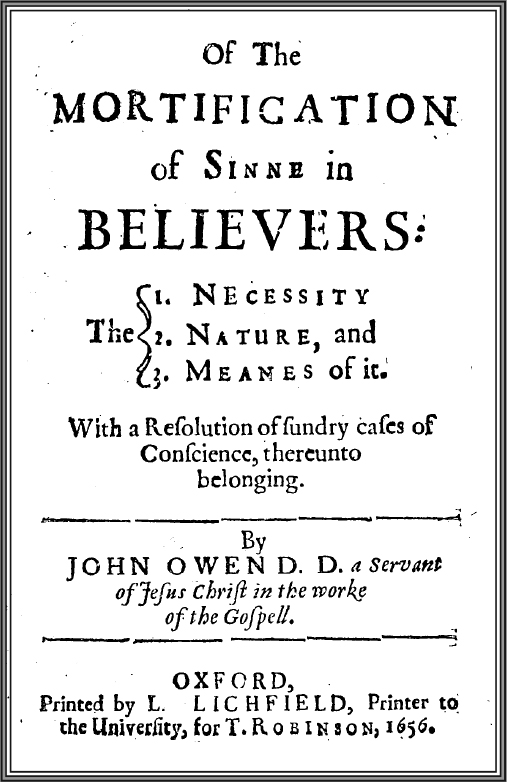OF THE MORTIFICATION OF SIN IN BELIEVERS
JOHN OWEN’S Of the Mortification of Sin in Believers is divided into three parts.1 Part 1 begins by explaining the necessity of mortification through an exposition of Romans 8:13—“If you through the Spirit do mortify the deeds of the body you shall live”—a foundational text in Owen’s theology of mortification. Owen then sets forth three foundational principles for the mortification of sin: first, believers, who are free from the condemning power of sin, ought to make it their daily work to mortify the indwelling power of sin; second, only the Holy Spirit is sufficient for this work; and third, the life, vigor, and comfort of the believer’s spiritual life depends much upon this work of mortifying sin.
In Part 2 Owen seeks to define the mortification of sin and to set forth directions for this duty. He begins by explaining what mortification is not. Mortification is not the utter destruction of sin, nor is it the concealing of sin. Mortification has not occurred just because one’s disposition has been improved, or because the sin has been diverted, or because the believer experiences an occasional conquest. So what is mortification? Owen argues that mortification is a habitual, successful weakening of sin that involves constant warfare and contention against the flesh.
Having defined mortification, Owen then turns to pastoral counsel on how to mortify sin. But first he sets forth some necessary conditions for mortification, namely, that one must be a believer, and that one must seek for universal mortification, before a single sin will be mortified.
Owen then offers nine particular directions for the soul with regard to mortification: (1) consider whether the sin you are contending with has any dangerous symptoms attending it; (2) get a clear and abiding sense upon your mind and conscience of the guilt, danger, and evil of that sin; (3) load your conscience with the guilt of it; (4) get a constant longing for deliverance from the power of it; (5) consider whether the sin is rooted in your nature and exacerbated by your temperament; (6) consider what occasions and advantages your sin has taken to exert and put forth itself, and watch against them all; (7) rise mightily against the first actings and conceptions of your sin; (8) meditate in such a way that you are filled at all times with self-abasement and thoughts of your own vileness; (9) listen to what God says to your soul and do not speak peace to yourself before God speaks it, but hearken what he says to your soul.
Finally, in Part 3 Owen explains that the foregoing is really preparation for the work of mortification. When we turn to the work of mortification itself, Owen offers two exhortations: first, we must set our faith on the cross-work of Christ for the killing of sin; second, the entire work of mortification must be done in the power of the Spirit.
1 A detailed outline of this book is found at the end of this volume.
